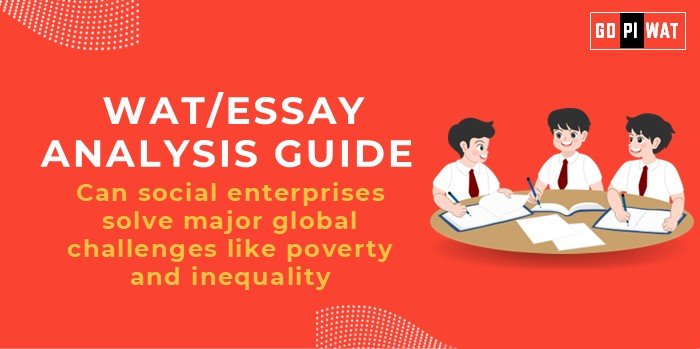✍️ Written Ability Test (WAT)/Essay Analysis Guide
🌍 Understanding the Topic’s Importance
Social enterprises bridge the gap between economic development and social progress. In B-schools, this essay explores concepts like sustainable business models, innovation, and ethical entrepreneurship.
🕒 Effective Planning and Writing
- Time Allocation (30 minutes):
- Planning: 5 minutes
- Writing: 20 minutes
- Review: 5 minutes
- Preparation Tips:
- Identify statistics (e.g., poverty rates, microfinance success).
- Note key stakeholders and examples (Grameen Bank, SEWA).
🔑 Introduction Techniques for Essays
1. Contrast Approach
“While economic growth lifted millions out of poverty, income inequality has surged, highlighting the need for innovative solutions like social enterprises.”
2. Solution-Based Introduction
“Social enterprises provide sustainable solutions to global challenges by aligning profit with purpose, offering a pathway to address poverty and inequality.”
📚 Structuring the Essay Body
1. Achievements
- Example: “Grameen Bank enabled financial inclusion for millions of women in Bangladesh, empowering them economically.”
- Impact: “Increased household incomes and improved quality of life.”
2. Challenges with Comparative Analysis
- Scalability Issues: “Unlike traditional businesses, social enterprises often struggle to scale operations beyond local areas.”
- Global Comparison: “Kenya’s M-Pesa showcases how technology can enable rapid financial inclusion.”
3. Future Outlook
“To scale, social enterprises require impact investments, government partnerships, and supportive policies.”
✅ Concluding Effectively
1. Balanced Perspective Conclusion
“Social enterprises offer powerful solutions to poverty and inequality, but their success depends on financial support, scalability, and systemic collaboration.”
2. Global Comparison Conclusion
“From Grameen Bank to M-Pesa, global success stories highlight the potential of social enterprises to transform lives, provided challenges like scalability and funding are addressed.”
📊 Analyzing Successes and Shortcomings
- Key Achievements: Microfinance success, skills development, financial inclusion.
- Ongoing Challenges: Scalability, policy barriers, funding limitations.
- Global Context: Kenya’s M-Pesa, Bangladesh’s Grameen Bank.
🌟 Recommendations for Sustainable Progress
- Increased government support through subsidies and incentives.
- Encouraging impact investment in social enterprises.
✒️ Sample Short Essays
1. Balanced Perspective
“Social enterprises merge innovation with purpose, solving challenges like poverty and inequality. However, without financial sustainability and policy support, their impact remains limited.”
2. Solution-Oriented
“To address poverty and inequality, social enterprises must scale globally, backed by impact investments and supportive policies for sustainable growth.”
3. Global Comparison
“Grameen Bank’s microfinance in Bangladesh and M-Pesa’s financial inclusion in Kenya demonstrate how social enterprises can address global challenges effectively.”


